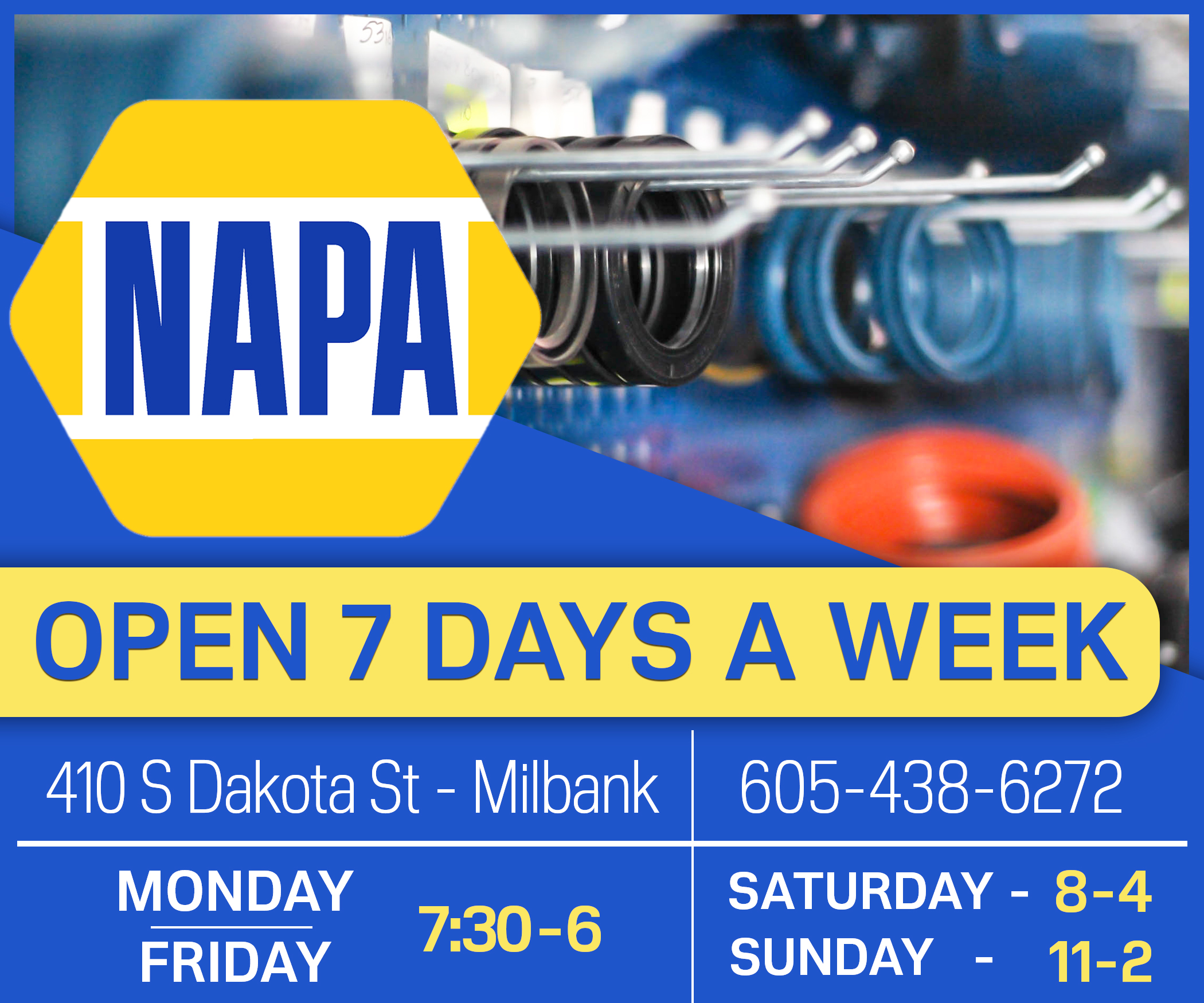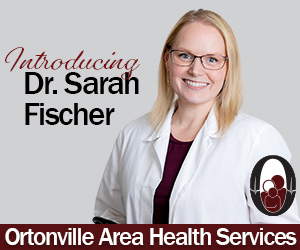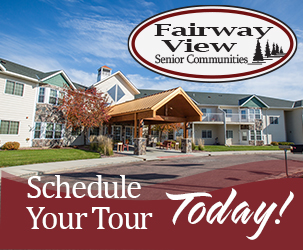House Candidates Voice Views at Public Forum
Local News November 2, 2016 Staff Writer 0

 On November 8, voters will cast their ballots to choose two members of the South Dakota House of Representatives. The four candidates met and shared their views during a public forum October 29, at the Milbank Visitor Center. Vying for the two seats, are Republicans John Mills of Volga and Jason Kettwig of Milbank, and Democrats Matt Rosdahl of Clear Lake and Peggy Schuelke of Revillo.
On November 8, voters will cast their ballots to choose two members of the South Dakota House of Representatives. The four candidates met and shared their views during a public forum October 29, at the Milbank Visitor Center. Vying for the two seats, are Republicans John Mills of Volga and Jason Kettwig of Milbank, and Democrats Matt Rosdahl of Clear Lake and Peggy Schuelke of Revillo.
Panelists were Kevin Kouba of Otter Tail Power Company, Bobbie Bohlen of Grant County Economic Development, and Holly Hilbrands of KMSD. The event was sponsored by the Milbank Area Chamber of Commerce, Grant County Economic Development, and Grant County Republicans.
In opening remarks, John Mills presented a short biography and explained his decision to run for office. Mills is 61 years old and grew up on a family farm just south of Volga. He has been married for 36 years and has two adult children and five grandchildren. He spent much of his career in the construction and real estate business in the Brookings area and has lived in Volga for 28 years. Mills said, “I was asked to run. Fred Deutsch decided against running again and the Republican party asked me. After praying about it and getting my wife’s approval, I said, ‘Yes.'” He went on to explain one of the reasons he accepted the nomination was for his grandkids. “I’ve seen a lot of changes in South Dakota and have some trouble with things I thought would never change. I think I can make a difference. I’m a problem solver and would like an opportunity to put those skills to work for you.”
Grant County native Peggy Schuelke grew up on a farm outside of Marvin and graduated from Milbank High School. She obtained her nursing degree at Augustana College in Sioux Falls. She and her husband, Jeff, who is also a Grant County native, moved back to the area in 1991 and took over farming Jeff’s father’s land. The couple continues to farm nearly 1,400 acres and raise cattle. She obtained her family nurse practitioner degree and has worked in Milbank and Revillo since 1994. Schuelke said, “I have spent my whole life taking care of people in whatever role that may be – as a nurse, mother, or grandmother. One of the reasons I decided to pursue this seat is because I was getting frustrated seeing South Dakota not pass Medicaid expansion. Every day I work, I see people negatively impacted by this. They do not have the money to afford insurance and cannot get the care they need. An unhealthy person is not a productive person. I feel the needs and desires of people in South Dakota aren’t being carried through. So, I would like to represent the people and not a political party.”
Matt Rosdahl is a resident of Clear Lake and a high school social studies teacher, head football coach, and student council advisor. He grew up on a family farm just outside Dawson, Minnesota. The farm is still in operation today. Matt graduated from Southwest Minnesota State University and received his masters degree from the University of Sioux Falls. He and his wife have two children. Rosdahl stated, “I decided to run for office because I felt we weren’t being properly represented. I feel our representatives have lost focus of what they are there to do. Things have become more about political parties and not about people.” Rosdahl wants to focus on education, small towns, and agriculture. “I feel those are the things that are most important and what I can do as your representative. I want to bring the focus back to you and work hard for our families, our students, and our teachers.”
 Jason Kettwig grew up on a small farm outside of Hazel. He attended South Dakota State University before entering active duty with the South Dakota National Guard for four years. Upon returning home, he purchased the local Taco John’s with his brother. He remained a member of the National Guard and was deployed to Iraq and Afghanistan. He returned to Milbank and was hired as the administrator for the City of Milbank. He has held this position for 12 years. He and his wife of 19 years, Terra, have three children. Kettwig explained, “I want to help revive small communities and small towns. Things that work in Sioux Falls and Rapid City don’t necessarily work in Milbank, and Clear Lake, and Volga. We need to approach things differently. We need to look at economic development differently. We don’t need to look at large 200-person manufacturing jobs here. We need to look at housing and workforce development to allow the small businesses we have to grow and reach their full potential.”
Jason Kettwig grew up on a small farm outside of Hazel. He attended South Dakota State University before entering active duty with the South Dakota National Guard for four years. Upon returning home, he purchased the local Taco John’s with his brother. He remained a member of the National Guard and was deployed to Iraq and Afghanistan. He returned to Milbank and was hired as the administrator for the City of Milbank. He has held this position for 12 years. He and his wife of 19 years, Terra, have three children. Kettwig explained, “I want to help revive small communities and small towns. Things that work in Sioux Falls and Rapid City don’t necessarily work in Milbank, and Clear Lake, and Volga. We need to approach things differently. We need to look at economic development differently. We don’t need to look at large 200-person manufacturing jobs here. We need to look at housing and workforce development to allow the small businesses we have to grow and reach their full potential.”
The candidates were also posed questions. Kouba asked each candidate to give two reason he or she wants to serve in Pierre.
Schuelke reiterated Medicaid expansion is her biggest concern. “The expansion of Medicaid has shown it would improve the health of our community and would also provide an economic boost and allow people to spend money on other entities.” She said she would also work to improve ethics within the government. “I feel we need more openness and more sunshine on our government. We need to eliminate the scandals we have had in the past.”
Rosdahl said he would focus most on education and be a voice for the people. “As an educator, I feel I have an inside advantage related to education that the other candidates don’t have. I believe there is nothing more important than the educational opportunities we offer our students. They are the future – what is going to make or break our state down the road. I feel we at least need to tweak the funding formula that was passed last year. There is more that we can do. I also want to be a voice and support small towns.”
Kettwig said he will focus on reviving small towns. He said the way to do this is through education and strengthening the education system. “We need to try to bring those kids back to our small towns after college so they want to raise their families in a small community. We can do this by providing a world-class education in our communities. We need to work at tweaking the funding formula to make sure the funds are going to the correct schools.” The second way Kettwig plans to revive small towns is through Medicaid expansion. “I think it’s a wonderful thing from a social standpoint, but we need to look at everything to make sure it is not going to result in a huge bill for South Dakota in years to come.”
Mills says playing defense is at the top of his list of items to focus on in Pierre. “I worry about government expansion. As a business person, every time the legislature is in session I worry about what they will come up with. What new tax will I have to pay? What new regulation? I am going out there first and foremost to play defense for our small towns, small businesses, and agriculture. That will always be at the top of my list. The impact of some bills passed is not always well thought out.” Secondly, Mills said he will focus on property taxes and how they can be improved.
Bohlen then addressed the group. She asked each candidate to explain what he or she sees as the biggest threat to the rural economy.
Rosdahl said he is unsure he sees big threats, but instead sees big opportunities. “In our rural communities, we have an opportunity to do more starting with agriculture and agribusiness. Agriculture is the most important industry in South Dakota. We can do more to support agriculture through infrastructure and opportunities for young farmers. In South Dakota we have opportunities for more growth with our renewable energy. Those are the two areas where I see incredible growth in our rural economy.”
Kettwig feels the greatest threat is the decline in population in the small towns and rural areas. “As farms grow, fewer and fewer people are actively involved in that process. We need to give them another reason to stay. We need to look at value-added agriculture or ways to work with the products our farmers are producing and add value to them and then ship them out at a better price.” Kettwig went on to say we also need to deal with housing in the small communities in a big way. “Housing in our small towns is different in each one, but they all have their issues. So, we need to work to increase and bring that quality of life up for those that choose to stay.”
Mills agreed with Kettwig that the decline in population and decline in agriculture serve as challenges. “These are a challenge, not only to the farming communities, but to the rural towns.” He would look to managing that change and said, “Value-added agricultural businesses are critical.”
Schuelke also agreed the decrease in population is a growing concern. “Right now, 80% of our district is ag-based. With a decline in commodity prices, there is less money to go around. I see a big change in our Main streets. We need dollars to be spent in our communities in order for them to recirculate.” She also stated we need to find a way to capture taxes from internet sales. She said she sees them as replacing local spending within the tax structure in rural communities.
Hilbrands continued the questioning. She asked whether or not each candidate would support the governor’s proposal for Medicaid expansion.
Kettwig replied by saying, “I can’t say if I agree or disagree with him at this time. We need to take a look at the expansion. I think it would be great if 55,000 South Dakotans that aren’t covered today, could be covered by health insurance. The issue I have is to make sure that it’s budget neutral. I need more information. We need to make sure we don’t rely on the federal government to make a payment to us every year in order to make it that way. We need to do this right so we can maintain it for the long haul. If it starts to cost the taxpayers of South Dakota millions and millions of dollars each year, it will consume our budget and we won’t be able to do the things we need to do. We need to make sure it makes sense fiscally.”
Mills says the jury is still out on whether he agrees or disagrees with the governor. “I still have a lot to learn about a lot of subjects and Medicaid expansion is one of those.” Mills also explained that he gained insight from a recent meeting. “I was in the company of members of the South Dakota Nurses Association. A nurse giving the presentation said she discovered how complicated the expansion is. So, if people within the healthcare industry have questions, then a layperson like me certainly has a lot to learn.” Mills also worries about the carrot today from the federal government and the club tomorrow. “I, too, want to make sure whatever we do, we can sustain it for the long haul.”
 Schuelke says she agrees with the governor’s proposal. “It has been shown to be budget neutral. She said, “The reason it is neutral is because it is linked to IHS funding -where IHS eligible patients that get care off of IHS hospitals would then be able to have that care reimbursed to the provider from IHS funds. This frees up enough money that we used to spend on IHS dual eligible patients that it will more than cover the cost of Medicaid expansion. South Dakota has to pay 10% at most. There are other federal programs we get money from. I don’t think we are going to have any problem with the federal government holding up their end of the bargain.”
Schuelke says she agrees with the governor’s proposal. “It has been shown to be budget neutral. She said, “The reason it is neutral is because it is linked to IHS funding -where IHS eligible patients that get care off of IHS hospitals would then be able to have that care reimbursed to the provider from IHS funds. This frees up enough money that we used to spend on IHS dual eligible patients that it will more than cover the cost of Medicaid expansion. South Dakota has to pay 10% at most. There are other federal programs we get money from. I don’t think we are going to have any problem with the federal government holding up their end of the bargain.”
Rosdahl said he is also strongly in favor of the governor’s proposal on Medicaid. “I would like to look at it more from the social point. This would impact 55,000 people in South Dakota. It would bring life-changing and needed healthcare. In our four-county area, that is 2,274 people we could help. It needs to be done. The governor has studied it and it’s something we need to accomplish in Pierre.”
Kouba then redirected the questioning. He asked the candidates to explain what qualities each had to convince 104 other legislators of his or her viewpoint.
Mills explained he was a business owner, had held a variety of leadership roles, and had employed as many as 80 people. He said he has managed multi-million dollar construction projects with many challenges and was able to be a leader in solving those problems. He added he had served on various boards – locally and statewide. “I have often been able to find a consensus with the projects, boards, and groups I have been a part of.”
Schuelke stated she has not held a legislative position, but has been a member of the local school board and served as its president. “As we get older, it’s easier to see others’ points of view. Everyone’s idea of common sense is a little bit different. I have worked well with other people. We have to have willingness to talk to people and listen and I will listen and take those ideas to Pierre.”
Rosdahl said he feels his job as a teacher has been very valuable in convincing other legislators to vote the same way. “Every day I have to convince 110 high school students that it’s important to learn about social studies. So, I think that’s probably tougher than convincing the legislature. The key is to listen and go there with an open mind and the understanding that we go there with the same goal – to make South Dakota better. I am willing to listen, to study, and be a voice for the people.”
Kettwig stated during his entire adult life he has held a position of leadership or a position which required creating a team to work toward a common goal. “The best way to do that is to ensure that everyone understands the common ground we have. With every issue out there, we have some common ground. There are parts we disagree on and some parts that we will never agree on, but we need to recognize those things we can agree on and realize those things we agree on are far greater than the one or two things we disagree on.”
Bohlen addressed the candidates regarding the issue of economic development. She asked each candidate to explain what recommendations he or she would have for the GOED so they might better represent rural South Dakota.
Schuelke began by saying, “A Milbank, South Dakota, is never going to be able to compete with a Walmart. We are never going to have that big mega-store here. Our smaller businesses and boutiques that specialize in making homemade jellies, or boxed cheese, or unique gift items – those things you cannot buy in a big box-store like Walmart. We need to be innovative in our small towns.” She also explained a small community cannot survive by bringing large businesses into the communities. “We want representation for the small businesses, too. Right now, I don’t think they get that boost from the GOED like bigger industries do.”
Rosdahl said he thinks we need to be a strong voice for our small communities. “We are going to have to go there and work harder than the representatives from the larger cities. We almost have to team up with other legislators from other rural communities to get legislation that will work for all of our small communities.” He said he believes Main street economies and housing industries need to be revitalized.
Kettwig opened by saying, “First we need to sit down and redefine what economic development is. I have been in meetings with the governor’s office on economic development and they tell you retail has no business in economic development. On Main Street in South Dakota, retail is sometimes the only thing small towns have.” He noted there are some housing programs to help, but it’s not what they push for. “We also need to try to transform the workforce we have here. People, who are no longer tied to farming practices, need to be retrained and put to work. The GOED can help with that, they just need to focus on small towns.”
 Mills said he feels opportunities are everywhere. “I would like for the state government to provide tools and not give handouts. That’s the way those opportunities will bubble to the surface.” He said many small towns could use help with the vision process. “The GOED could go into a small community to take a look at what it needs and then create tools to help.”
Mills said he feels opportunities are everywhere. “I would like for the state government to provide tools and not give handouts. That’s the way those opportunities will bubble to the surface.” He said many small towns could use help with the vision process. “The GOED could go into a small community to take a look at what it needs and then create tools to help.”
Hilbrands brought up the issue of the number of people in South Dakota who are considered the working poor. She asked, “What can the state of South Dakota do, if anything, to make sure that all people have enough?”
Rosdahl said he feels many of those people are the same people that can be helped through the Medicaid expansion. “It may not help put food on their table, but will certainly help with peace of mind and keep them healthy. I think we need to do more to support and create opportunities. More economic development will help create jobs which will lead to higher wages, which is a positive direction to move in.” Rosdahl said he does not believe in increasing handouts, but said the programs the state has are strong. “We just need to make sure we are supporting those people.”
Kettwig agreed Medicaid expansion is one part of what can be done to solve that problem. “ I think it will give those people the peace of mind to keep working healthier right from the start. The other part is training and retraining programs. We need to train a more expert work force. Our unemployment is too low. We need to try to expand the jobs we have in this town and support our businesses to help them expand and put more people to work at higher wages.”
Mills expressed his support for the working poor. “My heart goes out to those people. I believe that small things can make a big difference. One of those things is the unfair way we treat property taxes. That affects those people more than anyone. We need to fix that.”
Schuelke said Medicaid expansion is the key. “Giving a food handout or distribution helps for today, but it doesn’t help tomorrow. The increase in minimum wage has helped, but people still need to work two or three jobs to pay the bills. Education helps, too, in helping those people get higher paying jobs.”
It was Kouba’s turn again. He asked each candidate to describe the bill he or she would bring directly to the governor’s desk if they were selected as Legislator of the Day.
Kettwig reiterated the need for housing. “A bill to provide a permanent funding source for the housing legislation that is currently out there – to help with down payment assistance or to revitalize housing within the communities.”
Mills said he would present a bill on property taxes. “I think if we could lower the rents for people we could help the working poor. We could give young people the opportunity to save for a down payment. That might mean a new house in a small town and that is economic development.”
Schuelke would bring a bill for a needs-based scholarship for secondary education. “We are one of the few states in the nation that does not have a needs-based scholarship to give these students from the working poor families the chance to get a good education.”
Rosdahl stated he would bring a bill that has been brought multiple times – to create an ethics commission. “The scandals that have taken place in the last couple of years have brought South Dakota into the national spotlight in a negative way. It shows we have a strong need for more accountability in our government.”
Bohlen asked each candidate if he or she supported a tax increase. If so, how would the funds be used?
Mills mentioned he is opposed to tax increases in any form. “I look for smaller government so I cannot envision supporting a tax increase.” He noted that under emergency conditions if no other options were available, he would listen to a tax increase, but stated he is skeptical about needing to pay more taxes.
Schuelke said, “If we need to increase taxes in one area to fund something, then a problem will just develop in another. That would only happen in an emergency situation and we need to look at every alternative for every situation before raising taxes.”
 Rosdahl said common sense needs to be used in examining ways to improve things without raising taxes. “With that being said, I think we have something in place right now that we could easily transition into if we needed additional funding. Everyone is already supposed to be paying taxes on internet sale purchases. By enforcing the Main Street Fairness Act, the state funding would increase without necessarily increasing taxes with a new tax – it’s already on the books. Right now the plan is to use that tax to offset the half penny sales tax and reduce that over time. If we needed to, we could have both those in place and have the money we needed to run our programs.”
Rosdahl said common sense needs to be used in examining ways to improve things without raising taxes. “With that being said, I think we have something in place right now that we could easily transition into if we needed additional funding. Everyone is already supposed to be paying taxes on internet sale purchases. By enforcing the Main Street Fairness Act, the state funding would increase without necessarily increasing taxes with a new tax – it’s already on the books. Right now the plan is to use that tax to offset the half penny sales tax and reduce that over time. If we needed to, we could have both those in place and have the money we needed to run our programs.”
Kettwig looked to county government and their funding when presented with this issue. “It’s absolutely amazing we can still drive down some of the roads in our area. I am not for increasing taxes. I am for increasing the options that counties, townships, cities, and local governments have to raise funds on their own to make it work. The wheel and gas tax last year was a good example of that. It allowed the counties to approve it if they wanted to and, if not, it got voted down. I believe giving the taxing authority to the lowest possible level allows those people that are dealing with the people that are paying those taxes to put the money where it belongs.”
Hilbrands presented the final question of the session. She addressed the transgender bill and asked whether the candidates thought the legislature should revisit it or it should be dealt with by each school district.
Schuelke began by saying she is not in favor of discrimination in any form. “I think that issue was a solution in search of a problem. I think our local schools can handle this on a case-by-case basis. What is right for Grant-Deuel may not be right for Sioux Falls. I certainly do not think there was a need for a statewide bill. If it came back, I certainly would not support it.”
Rosdahl stated he would not be in support of that bill or anything similar to it. “I will go one step further in saying that that bill is one of the main reasons that I decided to run for legislature. I felt it was an incredible waste of time and money. As a teacher and coach who works within the schools, this is not a problem. The fact that it came so close to being passed and it took a veto by the governor – that scared me. I would be very much opposed to any kind of legislation similar to that.”
Kettwig said the question can be dealt with in several ways. “I think our school districts need some top cover on this. I don’t think we can leave out top cover for the schools. If the schools tried to enforce this law, common sense would tell you that the first complaint that resulted from this would result in a lawsuit. It would have been up to the school districts to fight that, and I don’t believe the schools have that kind of money laying around to fight this. What was passed last year was a bill that was unenforceable for school districts.” He also stated most people in this area believe options need to be provided to the school districts to protect all students.
Mills noted he tried to figure out what this bill was all about as it was taking place. “It wasn’t long after our legislature ended session that President Obama handed down a mandate saying ‘all schools will do this or we will take away your funding.’ What troubles me is children need boundaries and limits on what is appropriate and not appropriate. I come from a belief system that God made us male or female.”













No comments so far.
Be first to leave comment below.